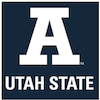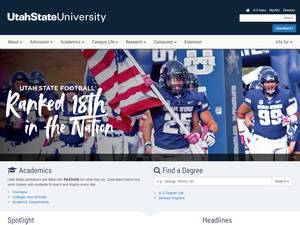The Wildlife Eco-Epidemiology Lab in the Veterinary and Clinical Life Sciences Department at Utah State University is seeking a highly motivated master’s student to join a multidisciplinary research team working to describe causes of avian mortality and risk factors for botulism outbreaks in the Great Salt Lake ecosystem of Utah.
The student will lead a study examining historic patterns and causes of mortality in birds (specifically waterfowl) in and around the Great Salt Lake using existing data, including necropsy findings. They will also assist in a postdoc-led study of avian botulism by helping to develop a surveillance and response plan for outbreaks, integrate several historical datasets of avian populations and lake hydrology, and generate epidemiologic models to identify risk factors for outbreaks and management actions to mitigate mortality.
This is primarily a data management and analysis position, though some field work may be possible as needed. This position provides an opportunity to work closely with academic researchers, state wildlife agencies, and community stakeholders. Collaborators include the USU Department of Wildland Resources, Utah Division of Wildlife Resources, and local non-profit organizations. Degree awarded would be in Biomedical Sciences
Utah State University Information

 Established in 1888, Utah State University is a non-profit public higher education institution located in the urban setting of the medium-sized town of Logan (population range of 10,000-49,999 inhabitants), Utah. This institution has also branch campuses in the following location(s): Roosevelt, Vernal, Price, San Juan, Tooele, Brigham City. Officially accredited and/or recognized by the Northwest Commission on Colleges and Universities, Utah State University (USU) is a very large (uniRank enrollment range: 30,000-34,999 students) coeducational higher education institution. Utah State University (USU) offers courses and programs leading to officially recognized higher education degrees such as pre-bachelor degrees (i.e. certificates, diplomas, associate or foundation degrees), bachelor degrees, master degrees, doctorate degrees in several areas of study. See the uniRank degree levels and areas of study matrix below for further details. This 131 years old higher-education institution has a selective admission policy based on entrance examinations and students' past academic record and grades. The admission rate range is 90-100% making this US higher education organization a least selective institution. International applicants are eligible to apply for enrollment.
Established in 1888, Utah State University is a non-profit public higher education institution located in the urban setting of the medium-sized town of Logan (population range of 10,000-49,999 inhabitants), Utah. This institution has also branch campuses in the following location(s): Roosevelt, Vernal, Price, San Juan, Tooele, Brigham City. Officially accredited and/or recognized by the Northwest Commission on Colleges and Universities, Utah State University (USU) is a very large (uniRank enrollment range: 30,000-34,999 students) coeducational higher education institution. Utah State University (USU) offers courses and programs leading to officially recognized higher education degrees such as pre-bachelor degrees (i.e. certificates, diplomas, associate or foundation degrees), bachelor degrees, master degrees, doctorate degrees in several areas of study. See the uniRank degree levels and areas of study matrix below for further details. This 131 years old higher-education institution has a selective admission policy based on entrance examinations and students' past academic record and grades. The admission rate range is 90-100% making this US higher education organization a least selective institution. International applicants are eligible to apply for enrollment.
Eligibility Criteria
Qualifications:
Minimum Qualifications:
- Bachelor’s degree in in epidemiology, disease ecology, wildlife biology, biological sciences, or related field.
- Strong communication, problem-solving, organizational, and teamwork skills.
- Ability to work with diverse stakeholder groups.
- Understanding and ability to follow safety procedures in a research setting (both field and laboratory).
- See department website for admission requirements (https://vetmed.usu.edu/vcls/).
Preferred Qualifications:
- Experience in research areas related to epidemiology, wildlife biology, quantitative ecology, population modeling, and/or remote sensing/GIS/spatial analyses.
- Experience with safe handling of live and dead animals, animal sampling, laboratory research in biosafety containment facilities (BSL-2 or above).
- Strong research and writing experience.
Offered Benefits
This position is fully funded for two years, including stipend ($22,000/year), tuition and fees, and health insurance
Application Process
Please submit all materials as a single PDF named: “Botulism_MS_LastName” to
Questions about this position and application materials can be addressed to Dr. Jessica Sanchez with the subject line “Botulism application – MS student.”
For more details, visit Utah State University Scholarship webpage
Required Documents:
- A cover letter (2 pages max) detailing how you meet the qualifications of the position, why you are interested in this position specifically, and why you might be a good fit for this project.
- A current CV.
- Writing sample (i.e., published manuscript, senior thesis, class paper).
- Copies of all transcripts (unofficial are acceptable).
- Contact information for three (3) professional/academic references


 Established in 1888, Utah State University is a non-profit public higher education institution located in the urban setting of the medium-sized town of Logan (population range of 10,000-49,999 inhabitants), Utah. This institution has also branch campuses in the following location(s): Roosevelt, Vernal, Price, San Juan, Tooele, Brigham City. Officially accredited and/or recognized by the Northwest Commission on Colleges and Universities, Utah State University (USU) is a very large (uniRank enrollment range: 30,000-34,999 students) coeducational higher education institution. Utah State University (USU) offers courses and programs leading to officially recognized higher education degrees such as pre-bachelor degrees (i.e. certificates, diplomas, associate or foundation degrees), bachelor degrees, master degrees, doctorate degrees in several areas of study. See the uniRank degree levels and areas of study matrix below for further details. This 131 years old higher-education institution has a selective admission policy based on entrance examinations and students' past academic record and grades. The admission rate range is 90-100% making this US higher education organization a least selective institution. International applicants are eligible to apply for enrollment.
Established in 1888, Utah State University is a non-profit public higher education institution located in the urban setting of the medium-sized town of Logan (population range of 10,000-49,999 inhabitants), Utah. This institution has also branch campuses in the following location(s): Roosevelt, Vernal, Price, San Juan, Tooele, Brigham City. Officially accredited and/or recognized by the Northwest Commission on Colleges and Universities, Utah State University (USU) is a very large (uniRank enrollment range: 30,000-34,999 students) coeducational higher education institution. Utah State University (USU) offers courses and programs leading to officially recognized higher education degrees such as pre-bachelor degrees (i.e. certificates, diplomas, associate or foundation degrees), bachelor degrees, master degrees, doctorate degrees in several areas of study. See the uniRank degree levels and areas of study matrix below for further details. This 131 years old higher-education institution has a selective admission policy based on entrance examinations and students' past academic record and grades. The admission rate range is 90-100% making this US higher education organization a least selective institution. International applicants are eligible to apply for enrollment.